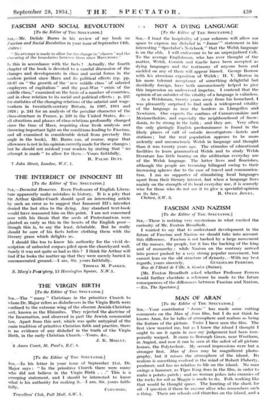NOT A DYING LANGUAGE [To the Editor of THE SPECTATOR.]
SIR,—I trust the hospitality of your columns will allow me space to express my disbelief in "Janus' statement in his interesting " Spectator's Notebook " that the Welsh language is on the ebb. I will endeavour to be an unprejudiced Celt. To the average Englishman, who has ever thought of the matter, Welsh, Cornish and Gaelic have been accepted as dying languages and the testimony of anyone born and suckled on any of them will appear biased. George Borrow with his atrocious exposition of Welsh ; H. V. Morton in his more tolerant acceptance of something delightful but decidedly foreign, have both unconsciously helped to give this impression an undeserved impetus. I contend that the opinion of an outsider of the vitality of a language is valueless.
As a Welshman, twenty years away from his homeland, I was pleasantly surprised to find such a widespread vitality of the language as near the borders as Llangollen and Newtown. One expects the confines of Carnarvonshire and Merionethshire, and especially the neighbourhood of Snow- donia, to be strong in the faith ; and they are. Very often the only glaringly English predominance is found in the likely places of call of outside investigators—hotels and stations ; but the real population appears to be more ardently and unconsciously Welsh in language and thought than it was twenty years ago. The stimulus of educational facilities to learn grammatical Welsh and to study Welsh literature has little bearing on the utilitarian everyday use of the Welsh language. The latter lives and flourishes, although the people are becoming bilingual owing to their increasing spheres due to the ease of travel and communica- tion. I am no supporter of stimulating local languages apart from their literary interest, but when a language lives mainly on the strength of its local everyday use, it is scarcely wise for those who do not use it to give a specialist opinion


















































 Previous page
Previous page